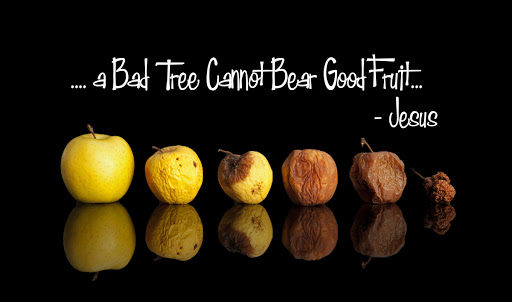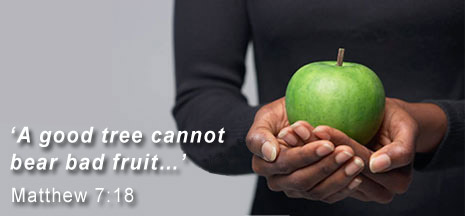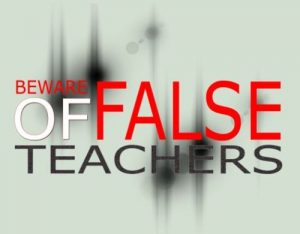In Matthew 7:15-19, Jesus tells His disciples how to tell good teachers from bad teachers. He tells them to look at the fruit. Is Jesus telling people to look at the lives of other teachers to see if they have good works? No! Not at all. Listen to the study to see what Jesus IS teaching and why this is important for properly understanding the gospel.
This study is an excerpt from my Gospel Dictionary online course. This course considers 52 key words of the Gospel and thousands of biblical texts. The course contains over 100 hours Bible teaching. You can take the course by joining my online discipleship group.

What is the Good Fruit in Matthew 7:15-19
Beware of false prophets, who come to you in sheep’s clothing, but inwardly they are ravenous wolves. You will know them by their fruits. Do men gather grapes from thornbushes or figs from thistles? Even so, every good tree bears good fruit, but a bad tree bears bad fruit. A good tree cannot bear bad fruit, nor can a bad tree bear good fruit. Every tree that does not bear good fruit is cut down and thrown into the fire (Matthew 7:15-19)
In Matthew 7:15-19, Jesus instructs His followers to look to the fruit of a prophet as a way of determining whether or not that person is a true or false prophet. Good fruit comes from a good teacher and bad fruit will come from a bad teacher. It is clear from the context that Jesus is not talking about their works when He refers to their fruit.
Why not?
Because Jesus reveals that the false prophets have more and better good works than the average person. They prophecy in Jesus’ name, cast out demons, and perform many miracles (Matt 7:22). They even submit to the Lordship of Jesus Christ (Matt 7:21). But Jesus says they didn’t do the will of God and He doesn’t even know them (Matt 7:21, 23). Submitting to the Lordship of Jesus Christ and performing a myriad of good works proves nothing whatsoever one way or the other about whether or not a person truly belongs to Jesus.

Therefore, what is the fruit to which Jesus refers? It is the words of the false prophets and how these words line up with the rest of Scripture. In Hebrew thinking, the fruit of a person’s life is primarily seen in their words. The book of Proverbs frequently reveals that the fruit of our life is our words, that we will live or die by what we say, and that our words reveal what we believe in our hearts (cf. Prov 13:2-3; 18:20-21).
The same is true for deciding who is a good teacher and who is a bad teacher.
Bad Teachers Often Look Good
When it comes to discerning good teachers from bad, the words a teacher speaks are critically important because actions are often imitated and faked by false teachers. Indeed, false teachers often make sure they do their good works in front of a watching audience so that there are many witnesses to their charitable deeds and generous actions.
All false teachers look good on the outside.
Jesus says that although false teachers are ravenous wolves on the inside, they wear sheep’s clothing on the outside. By their behavior and actions, they appear to be part of God’s flock. They look like sheep. But their words betray them. Their words reveal the true condition of their heart. It is their words, not their behavior, which reveal that they are wolves.
 It is important to note that this passage, like many of the others about fruit, applies only to prophets and teachers. Jesus is not giving a blanket statement here about judging the average person.
It is important to note that this passage, like many of the others about fruit, applies only to prophets and teachers. Jesus is not giving a blanket statement here about judging the average person.
In general, there is truth to the saying that “Actions speak louder than words.” In regards to life-related issues such as parenting, marriage, friendships, and employment, people can say all sorts of things and make all sorts of promises, but it is the follow-through of actual behavior that counts the most. So in most areas of life, the actions of a person are important.
But this is not the case when it comes to Bible teaching.
When it comes to discerning a good and healthy teacher of Scripture from a false and unhealthy one, the best and primary way to make this distinction is to ignore the works and look to the words (cf. 2 Pet 2:1-3, 12, 18; Jude 8, 10, 16). To discover wolves in sheep’s clothing you must ignore the outward appearance, for they look, act, and smell like sheep. To discover a wolf, you must look a wolf in the mouth. You must listen to what comes from their lips and then compare it with the truth of Scripture. When you do this, you will see a wolf for what it is. In the words of Little Red Riding Hood, you will find yourself saying, “My! What big teeth you have!”
It’s Not about Eternal Destiny
Note that even here, the issue is not about a person’s eternal destiny.
Neither words nor actions prove whether or not a person has eternal life. Though Jesus does speak about fire in the context, He is not referring to hell, but to the temporal discipline that comes in a person’s life now. The reference to fire is not a warning about an eternal place of torture and suffering, but a warning about what could happen to those who teach false doctrine and those who listen to it.
The opposite of fire is the kingdom of heaven, which Jesus mentions in context (Matthew 7:21). Entering and experiencing the kingdom of heaven is not the same thing as going to heaven when we die. Instead, entering, or living within, the kingdom of heaven refers to experiencing the rule and reign of God in our lives here and now on this earth.
 So neither the reference to fire nor the reference to the kingdom of God have anything to do with eternal destiny, but everything to do with what we experience now in the life based on what sort of teachings we hear and whether or not we follow such teachings.
So neither the reference to fire nor the reference to the kingdom of God have anything to do with eternal destiny, but everything to do with what we experience now in the life based on what sort of teachings we hear and whether or not we follow such teachings.
Teaching the right things, submitting to the Lordship of Jesus, and doing the will of God do not help us earn, keep, or prove that we have eternal life, but are instead beneficial for living under the rule and reign of God in our lives. False teachers miss out on what God wants for their lives because they teach wrong truths for selfish reasons. They will experience fire instead of the kingdom of God. Jesus wants His disciples to stay away from such teachers, and so invites us to look at the words they say as an indication of whether they should be listened to and followed. Those whose words do not line up with the revealed truth in Scripture should be avoided and ignored.
If you want to avoid fire in your life and instead experience the reign of God, be careful about who you listen to and what you teach.
Only listen to those whose words line up with the rest of Scripture, and only teach things to other people that are also in agreement with Scripture.
 Understanding the Gospel requires us to properly understand the key words and terms of the Gospel. Take my course, "The Gospel Dictionary" to learn about the 52 key words of the Gospel, and hundreds of Bible passages that use these words.
Understanding the Gospel requires us to properly understand the key words and terms of the Gospel. Take my course, "The Gospel Dictionary" to learn about the 52 key words of the Gospel, and hundreds of Bible passages that use these words.
This course costs $297, but when you join the Discipleship group, you can to take the entire course for free.



